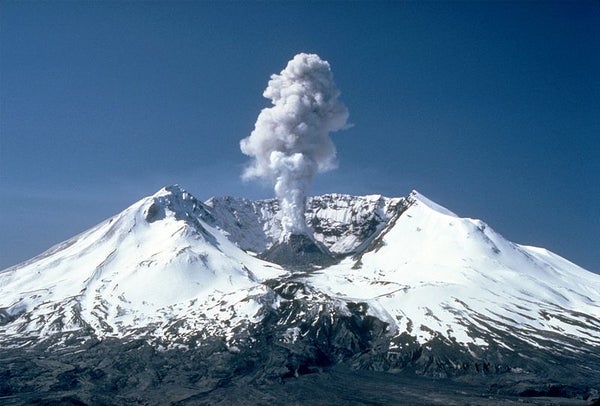This article was published in Scientific American’s former blog network and reflects the views of the author, not necessarily those of Scientific American
Recently, there was an all-day party at the new homestead, which featured Don Ehlen's outstanding collection of gorgeous and fascinating insects. I want to relate something Don said as we talked science, the universe, and everything. We were discussing the aftermath of Mount St. Helens's May 18th, 1980 eruption. And he mentioned an insight he'd had hiking there in the years after. Lupines were among the first plants to colonize the blast zone, and there's a particular caterpillar or some such that feeds and lives upon them. I wish I could remember what, but I was exhausted and slightly sloshed at that point, so memory falters, alas. Anyway. The area he hiked through was teeming with lupines and a far bigger population of these particular arthropods than normal. And he said he realized that what was a complete disaster from other perspectives happened to be a Golden Age to these little dudes. They'd had to put up with just the occasional lupine dotted here and there before. Now, they had all the lupines they could possibly want. The world, from their perspective, had improved immensely.
And I love that insight. It's so true. A disaster to some can be a boon to others. It's a matter of perspective.
On supporting science journalism
If you're enjoying this article, consider supporting our award-winning journalism by subscribing. By purchasing a subscription you are helping to ensure the future of impactful stories about the discoveries and ideas shaping our world today.
It helps to remember that on human scales, too. But it's also one of those things I love pointing out to people who look at something like the St. Helens eruption and see only destruction. This is how a volcano is built. This is how the world works. This is how these phenomenally beautiful landscapes come into being. And destruction in nature certainly has its own beauty. The cycle of creation and destruction, tearing down and building up, is a beautiful thing to watch - as long as you're not one of the ones whose existence is made impossible by the events in question.
Those lupines were among the first plants to colonize the barren wastes. They made it possible for other plants and animals to follow. Life always seems to find a way.
I used to worry about what would happen when humans managed to make the world uninhabitable for ourselves. I still worry a bit on our account, and for those species whose existence is threatened by our shortsightedness, but from a long-term perspective, I no longer have any fears. Our destruction will be a boon to some plant, some insect, some animal, somewhere. Life on this planet will find a way to go on. And it will be beautiful, with or without us.
And without us in the way, at least the cephalopods and the corvids can get on with evolving increasing levels of intelligence and take over the world. Can you imagine, hundreds of thousands of years from now, a new sentient species developing its own science, and its own understanding of the earth's history, and putting together the story of those extinct lifeforms known as humans? Will they realize that we were responsible for our own doom, and be thankful that our demise cleared the way for their golden age?
I actually find this idea kinda neat. And it's comforting, the knowledge that the earth will do just fine without us. I'd love very much for humankind to get a grip and preserve our species and others. But it's nice to know that the world won't end with us.
Destruction is also a form of creation. I hope never to forget that.
Originally published at En Tequila Es Verdad.

